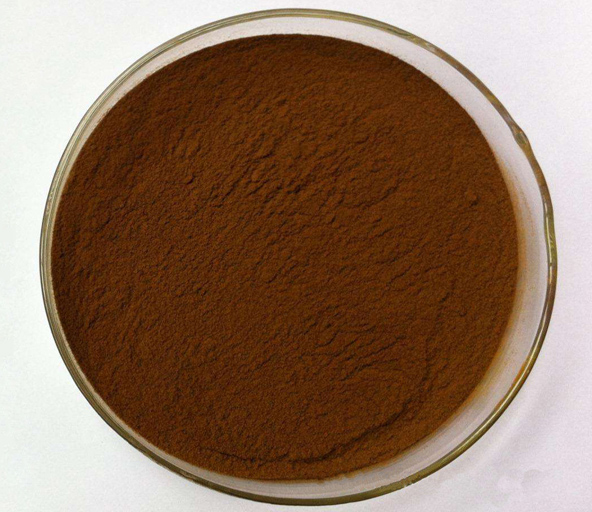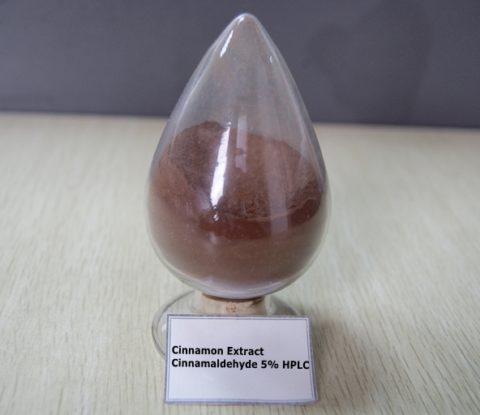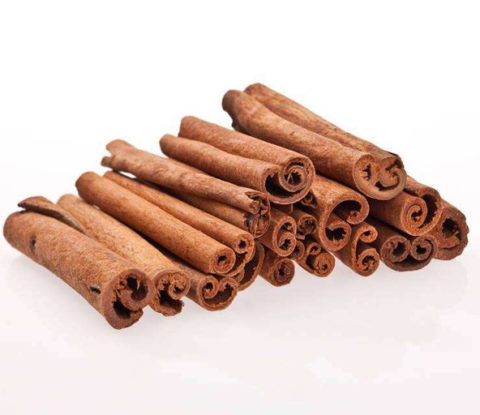
Cinnamon bark extract powder, Polyphenol 5%, 10%, 20%, 30% UV
Cinnamon Bark Extract
【Latin Name】: Cinnamomum verum
【Part used】: Bark
【Active ingredient】: Cinnamaldehyde,Polyphenol,Flavone
【Specification】: Cinnamaldehyde 5% HPLC, Polyphenol10-30% UV
【CAS No. 】: 104-55-2(Cinnamaldehyde)
【Appearance】: Brown powder
【Particle size】: 100% pass 80 mesh
Cinnamon bark extract powder
[Latin name]: Cinnamomum cassia Presl
[part used]: Bark
[main specification]: 10:1 20:1 TLC, cinnamon polyphenol 5%, 10%, 20%, 30% UV
[appearance character]: yellow brown fine powder
[particle size]: 95% pass 80 meshe
[packing]: 25kg/fiber drum or aluminium foil bag
[storage Conditions]: Stored in dry, cool and well ventilated plac
[shelf life]:Valid for 24 months since manufacturing date.
 Cinnamon is a spice obtained from the inner bark of several tree species from the genus Cinnamomum. Cinnamon is used in both sweet and savoury foods. The term “cinnamon” also refers to its mid-brown colour. Cinnamomum verum is sometimes considered to be “true cinnamon”, but most cinnamon in international commerce is derived from related species, also referred to as “cassia” to distinguish them from “true cinnamon”. Cinnamon is the name for perhaps a dozen species of trees and the commercial spice products that some of them produce. All are members of the genus Cinnamomum in the family Lauraceae. Only a few Cinnamomum species are grown commercially for spice.
Cinnamon is a spice obtained from the inner bark of several tree species from the genus Cinnamomum. Cinnamon is used in both sweet and savoury foods. The term “cinnamon” also refers to its mid-brown colour. Cinnamomum verum is sometimes considered to be “true cinnamon”, but most cinnamon in international commerce is derived from related species, also referred to as “cassia” to distinguish them from “true cinnamon”. Cinnamon is the name for perhaps a dozen species of trees and the commercial spice products that some of them produce. All are members of the genus Cinnamomum in the family Lauraceae. Only a few Cinnamomum species are grown commercially for spice.
The composition of different Cinnamomum species has been widely investigated. The compositions contain cinnamaldehyde, linalool, camphor, terpinen-4-ol and 1,8-cineole, eugenol, safrole, γ-muurolene, α-cadinol, germacrene D, α- terpineol, α-cadiene, 1,6-octadien-3-ol,3,7-dimethyl and 1-phenyl-propanr-2,2-diol diethanoate as major compounds.
Cinnamon is a powerful spice that has been used medicinally around the world for thousands of years. It is still used daily in many cultures because of its widespread health benefits, not to mention its distinctly sweet, warming taste and ease of use in recipes. According to researchers, out of twenty-six of the most popular herbs and medicinal spices in the world, cinnamon actually ranks No.1 in terms of its protective antioxidant levels. The unique smell, color, and flavor of cinnamon is due to the oily part of the tree that it grows from. The health benefits of cinnamon come from the bark of the Cinnamomum tree. This bark contains several special compounds which are responsible for its many health promoting properties- including cinnamaldehyde, cinnamic acid, and cinnamate.
Researchers have concluded that the health benefits of cinnamon can be obtained in the form of its pure bark, essential oils, in ground spice form (which is bark powder), or in extract form when its special phenolic compounds, flavonoids, and antioxidants are isolated. These compounds make cinnamon one of the most beneficial spices on earth, giving it antioxidant, anti-inflammatory, anti-diabetic, anti-microbial, immunity-boosting, cancer and heart disease-protecting abilities.
Benefits of Cinnamon Extract
1. Blood Sugar Control
Several studies have found that cinnamon extract has properties that helps those with insulin resistance. It is therefore very popular with Type 2 diabetics who take it to control their blood sugar variations. Ceylon Cinnamon is particularly popular because it has low levels of Coumarin. In case you did not know Coumarin in high doses can cause liver damage. One review of 543 people with type 2 diabetes found taking it was associated with an average decrease of over 24 mg/dL (1.33 mmol/L) (1). While these study results are pretty clear, studies investigating its effects on hemoglobin A1c, a measure of long-term blood sugar control, have yielded conflicting results. Some studies report significant decreases in hemoglobin A1c, while others report no effect (2). The conflicting results may be partially explained by differences in the amount of cinnamon given and prior blood sugar control of participants (3).
2. Antioxidant property of cinnamon extract
With an ORAC value of 267536 μmol TE/100g (USDA 2007) cinnamon is one of the top seven anti-oxidants in the world. Anti-oxidants reduces the formation of Free Radicals that cause cancer. This study found cinnamon bark extract has sufficient anti-oxidant properties and makes for improved food palatability. Cinnamon is packed with a variety of protective antioxidants that reduce free radical damage and slow the aging process; in fact researchers have identified forty-one different protective compounds of cinnamon to date. (4) (5)
According to the OTAC scale, which is used to measure the concentration of antioxidants in different foods, cinnamon ranks No. 7 of all foods, spices, and herbs across the world. And in a study that compared the antioxidant activity of 26 spices, cinnamon was deemed the winner and proved to be higher in antioxidants than other powerful herbs and spices including garlic, thyme, rosemary, and oregano. The health benefits of cinnamon are attributed to the type of antioxidants called polyphenols, phenolic acid, and flavonoids. These are similar antioxidants to those that can be found in other “superfoods” including berries, red wine, and dark chocolate. These compounds work to fight oxidative stress in the body, which can lead to disease formation when uncontrolled, especially as someone ages.
The different antioxidants present in cinnamon help to reduce a multitude of symptoms and diseases because they are free-radical-scavengers. The health benefits of cinnamon include its ability to reduce many forms of oxidative stress, including the ability to limit nitric oxide build up in the blood and lipid (fat) peroxidation, which can both add to instances of brain disorders, cancer, heart disease, and other conditions. (4)
3. Lowering LDL cholesterol & triglycerides of Cinnamon extract
According to a Mayo clinic article the only possible way Cinnamon could lower cholesterol is indirectly via how the body processes sugar and fat. But there is no direct effect on cholesterol. Still another study in Pakistan found Cinnamon reduced triglyceride (23-30%), LDL cholesterol (7-27%), and total cholesterol (12-26%).
Studies have shown that another health benefit of cinnamon is that it reduces several of the most common risk factors for heart disease, including high cholesterol levels, high triglyceride levels, and high blood pressure. (6)
The special compounds in cinnamon are able to help reduce levels of total cholesterol, LDL “bad” cholesterol and triglycerides, while HDL “good” cholesterol remains stable. Cinnamon has also been shown to reduce high blood pressure, which is another threat for causing heart disease or a stroke. (4)
And there are even more heart health benefits of cinnamon. Research shows that cinnamon is a helpful blood coagulant and prevents bleeding by helping the body to form blood clots. Cinnamon also increases blood circulation and advances bodily tissue’s ability to repair itself after it’s been damaged. This includes heart tissue which is in need of regeneration in order to fight heart attacks, heart disease, and stroke.
4. Cinnamon extract can fights Diabetes
Cinnamon is known to have an anti-diabetic effect. It helps lower blood sugar levels and also can improve sensitivity to the hormone insulin, which is the vital hormone needed for keeping blood sugar levels balanced. (7) Diabetes is formed when insulin resistance occurs and poor glycemic control takes places, or someone develops the inability to manage how much sugar (glucose) enters the blood stream. The same problem with insulin resistence is also associated with other conditions like metabolic syndrome and weight gain too.
These benefits of cinnamon exist because it plays a part in blocking certain enzymes called alanines which allows for glucose (sugar) to be absorbed into the blood. Therefore it has been shown to decrease the amount of glucose that enters the bloodstream after a high-sugar meal, which is especially important for those with diabetes. For this reason, many studies have shown that people with type 2 diabetes can experience significant positive effects on blood sugar markers by supplementing with cinnamon extract. (4) Another benefit for those with diabetes is that cinnamon helps combat heart disease and lowers bad LDL cholesterol levels, which those with diabetes are more at risk for developing.
5. Cinnamon extract can prevent Cognitive Decline & Protects Brain Function
Research also shows that another benefit of cinnamon’s protective antioxidant properties is that they can help defend the brain against developing neurological disorders, such as Parkinson’s and Alzheimer’s diseases. (4) One way that cinnamon protects cognitive function and brain health is because it activates neuro-protective proteins that protect brain cells from mutation and undergoing damage. This further reduces the negative effects of oxidative stress by stopping cells from morphing and self-destructing. Because cinnamon contains so many antioxidants and anti-inflammatory compounds that reduce the effects of aging on the body and brain, in the future we may see it being used as a possible natural therapeutic treatment or prevention for age-related neuro-degenerative diseases.
Reference:
1. Robert W. Allen. etal, Cinnamon Use in Type 2 Diabetes: An Updated Systematic Review and Meta-Analysis, Ann Fam Med. 2013 Sep; 11(5): 452–459. doi: 10.1370/afm.1517
2. Akilen R., etal, Glycated haemoglobin and blood pressure-lowering effect of cinnamon in multi-ethnic Type 2 diabetic patients in the UK: a randomized, placebo-controlled, double-blind clinical trial. Diabet Med. 2010 Oct;27(10):1159-67. doi: 10.1111/j.1464-5491.2010.03079.x.
3. Anderson RA., etal, Cinnamon: potential role in the prevention of insulin resistance, metabolic syndrome, and type 2 diabetes. J Diabetes Sci Technol. 2010 May 1;4(3):685-93.
4. Pasupuleti Visweswara Rao, etal, Cinnamon: A Multifaceted Medicinal Plant, Evid Based Complement Alternat Med. 2014; 2014: 642942. Published online 2014 Apr 10. doi: 10.1155/2014/642942
5. Dhuley JN, Anti-oxidant effects of cinnamon (Cinnamomum verum) bark and greater cardamom (Amomum subulatum) seeds in rats fed high fat diet. Indian J Exp Biol. 1999 Mar;37(3):238-42.
6. Akilen R. etal, Glycated haemoglobin and blood pressure-lowering effect of cinnamon in multi-ethnic Type 2 diabetic patients in the UK: a randomized, placebo-controlled, double-blind clinical trial. Diabet Med. 2010 Oct;27(10):1159-67. doi: 10.1111/j.1464-5491.2010.03079.x.
7. Kirkham S. etal, The potential of cinnamon to reduce blood glucose levels in patients with type 2 diabetes and insulin resistance. Diabetes Obes Metab. 2009 Dec;11(12):1100-13. doi: 10.1111/j.1463-1326.2009.01094.x.




